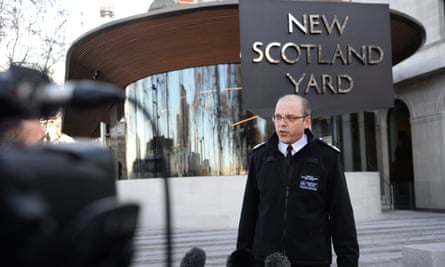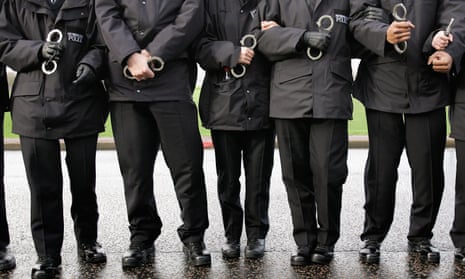Britain’s largest police force will have to justify its use of handcuffs following a review that was triggered after the stop and search of Olympic athlete Bianca Williams.
Williams, 27, accused the Metropolitan police of racially profiling her and her partner, Ricardo dos Santos, a Portuguese sprinter, when they were handcuffed and separated from their three-month-old son last July after their car was stopped by officers.
The Met commissioner, Cressida Dick, apologised to the athletes after footage of the incident in Maida Vale, north-west London, was posted online by the Olympic medallist Linford Christie, who coaches the pair. The couple were found to have committed no offence.
Dick launched a review into the use of handcuffs where an arrest has not been made, a tactic most commonly deployed during stop and search.
Scotland Yard said the force will improve its “training, policy and processes” following the review, which makes 10 recommendations.
“The Met will now develop a specific policy on handcuffing pre-arrest that will set out clear guidance for officers, including the requirement to justify any initial application of handcuffs as well as their continued use during an interaction,” a statement said. Recommendations include “additional legal training, extended officer safety and improved personal safety training for police officers, de-escalation tactics and more community input to understand the respective experiences of each during encounters”.
The Met has also amended its stop and search e-form to include any use and justification for handcuffs pre-arrest.
The review included consultations with young black men, aged 16-25, as well as with frontline officers. The review said: “The public are concerned that the use of handcuffs can be degrading and, whilst accepting there is a place for it, handcuffs should not be the first resort, and more effort should be made in communication and explanation that might make the use of handcuffs unnecessary.

“The use of handcuffs pre-arrest is an issue of community concern. It is clear that there is a sound legal basis in some circumstances for the use of handcuffs pre-arrest in order to conduct a stop and search. However, this needs to be justified on every occasion and cannot, and must not, be considered a matter of routine or common practice that is done without proper consideration and recording on each occasion.”
The Met deputy assistant commissioner Matt Twist, who led the review, said: “The Met is determined to be the most trusted police service in the world … I am grateful to the members of the public, police officers and critical friends who took time to help with this important work, which I believe will help us to improve our practices and with it, the trust of the public.”
